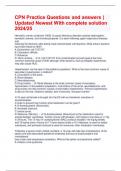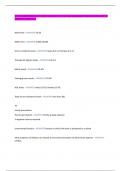Other
Important terms and exam questions to study for Medical Pharmacology, Vrije Universiteit Amsterdam (AB_1199)
- Course
- Institution
These terms are all from the booklet which is needed for the course. I also have some practice exam questions in here, which are very similar to the actual exam. If you study this well, you will be guaranteed of a good grade. By studying this alone, I got an 8 for my exam! Reading summaries offe...
[Show more]





